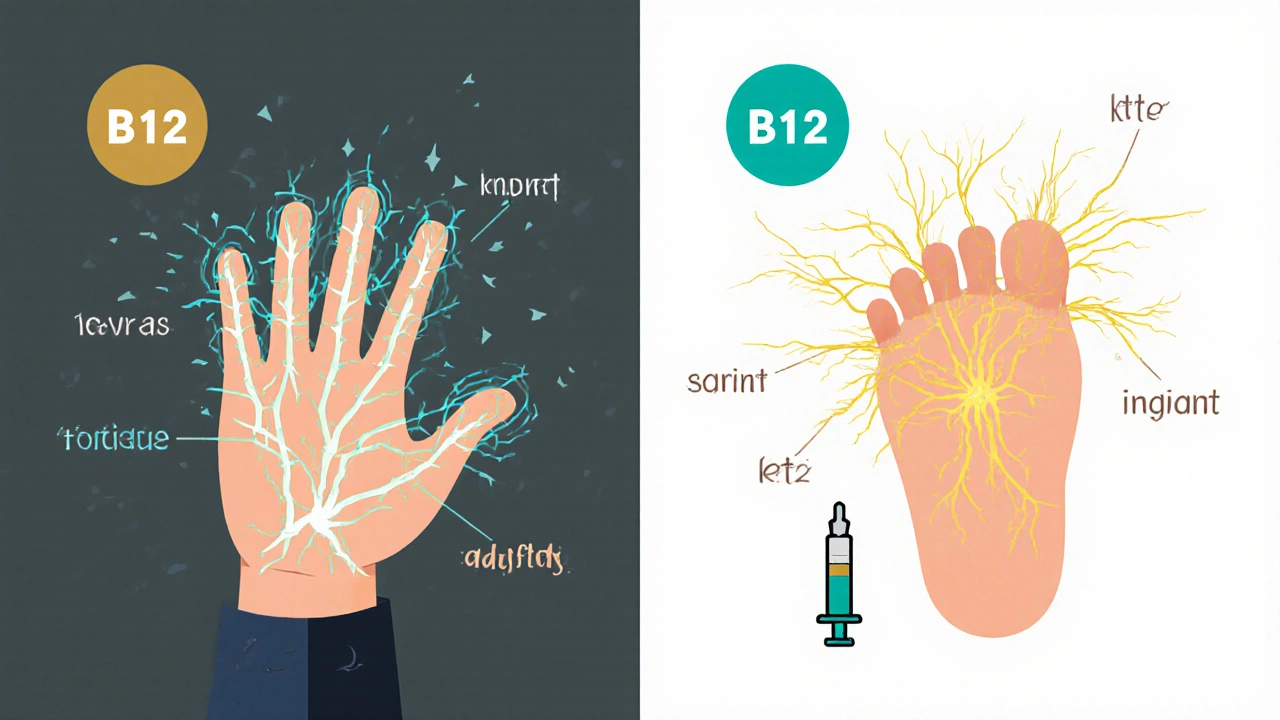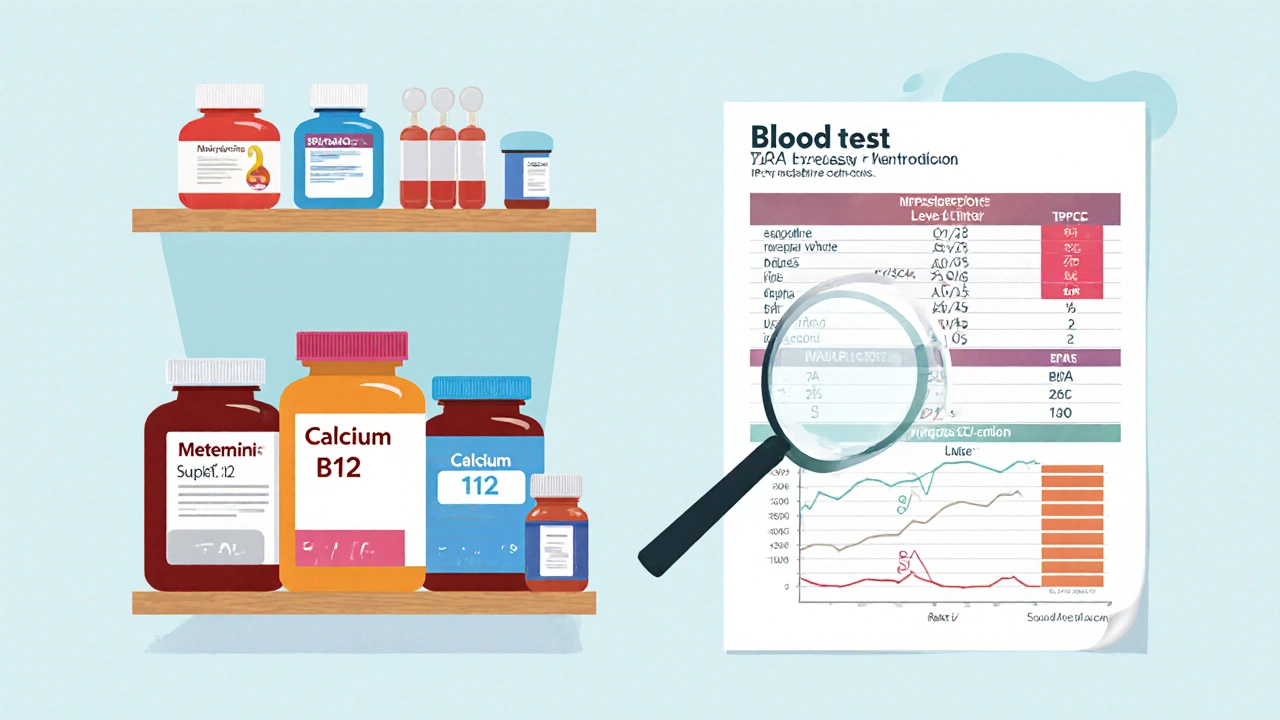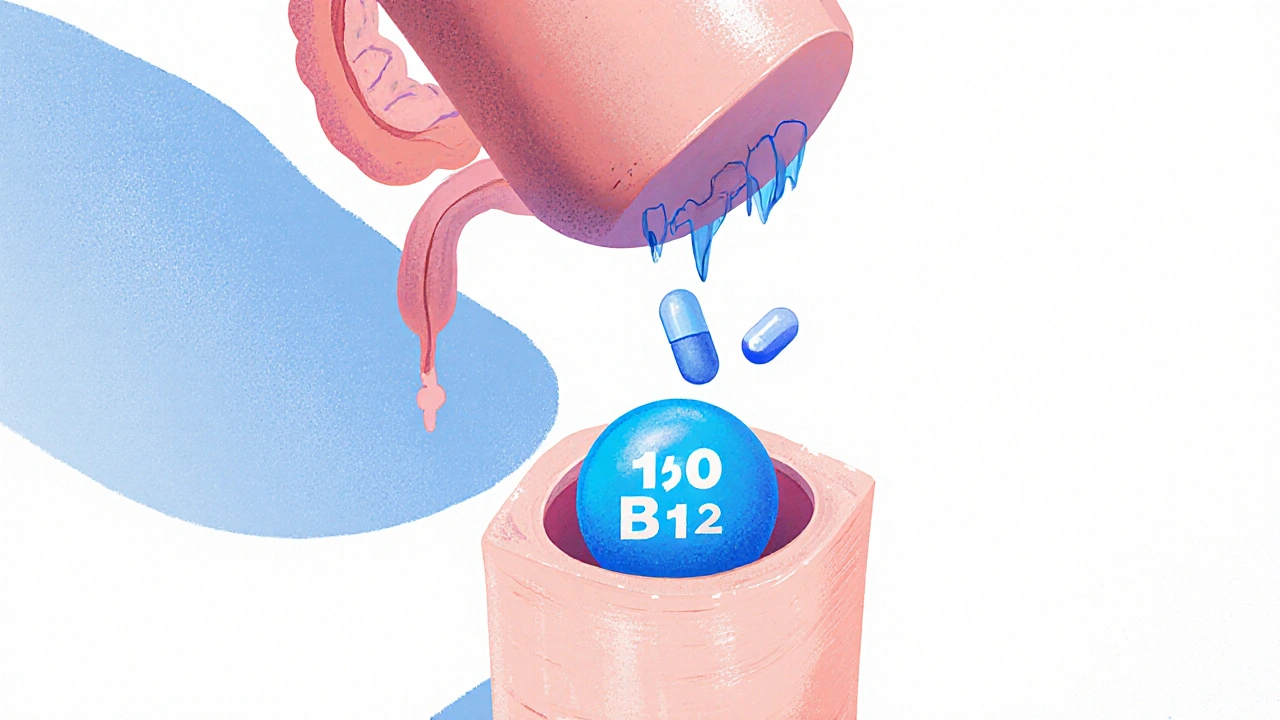Metformin B12 Deficiency Risk Calculator
Assess Your Risk
Based on the latest research from the Diabetes Prevention Program and MHRA guidelines.
Your Risk Assessment
For over 25 years, metformin has been the go-to pill for managing type 2 diabetes. It’s cheap, effective, and generally safe. But there’s a quiet, growing problem that many patients - and even some doctors - still don’t talk about: metformin can slowly drain your body of vitamin B12. And if left unchecked, that deficiency doesn’t just cause fatigue. It can lead to nerve damage so severe it becomes permanent.
How Metformin Steals Your B12
Metformin doesn’t work by lowering blood sugar directly. Instead, it makes your body more sensitive to insulin and reduces sugar production in the liver. But deep in your small intestine, something else is happening. Metformin interferes with calcium-dependent receptors that absorb vitamin B12 from food. Without enough calcium to help the process, your body can’t grab onto B12 the way it should. Studies show this cuts absorption by 25-30%.
It’s not a sudden drop. Your liver stores about 2,500 micrograms of B12. You only need 2.4 micrograms a day. So it takes years - often 4 to 10 - before your levels dip low enough to cause problems. That’s why most people don’t notice anything until they’ve been on metformin for a long time. And by then, damage might already be done.
The Real Risk: It’s Not Rare - It’s Common
The UK Medicines and Healthcare products Regulatory Agency (MHRA) updated its warning in July 2022: vitamin B12 deficiency is now considered a common side effect of metformin. Not rare. Not theoretical. Common.
The landmark Diabetes Prevention Program Outcomes Study (DPPOS), which followed over 3,000 people for 13 years, found that each year of metformin use raised the risk of B12 deficiency by 13%. For someone on metformin for 10 years? That’s more than a 100% increased risk. And it gets worse with higher doses. Every extra 1 gram of metformin per day more than doubles your chance of becoming deficient.
It’s not just about the drug. If you’re also taking a proton-pump inhibitor (PPI) like omeprazole for heartburn - which about 40% of people with type 2 diabetes do - your risk shoots up again. PPIs block stomach acid, which is needed to free B12 from food. So you’ve got two mechanisms working against you: metformin blocking absorption, and PPIs preventing release.
What Symptoms Do You Actually See?
This is where things get dangerous. The symptoms of B12 deficiency look a lot like diabetes complications. Fatigue? That’s common in diabetes. Numbness in your feet? That’s diabetic neuropathy. Memory fog? Stress or aging, right?
But here’s the truth: these aren’t always diabetes. A 2023 review in Clinical Diabetology found that 38% of patients with metformin-induced B12 deficiency showed neurological symptoms - like tingling, balance problems, or vision changes - before they ever developed anemia. That’s critical. Anemia is the classic sign of B12 deficiency. But it’s often the last to appear.
Real patient stories back this up. One person on the NHS patient forum, diagnosed with diabetes in 2008, had worsening nerve pain for years. Doctors kept adjusting diabetes meds. Then a new GP ordered a B12 test. Their level was 128 pmol/L - far below the normal range of over 221 pmol/L. After six months of B12 injections, their neuropathy improved dramatically.
Another Reddit user described a five-year journey of misdiagnosis. By the time B12 deficiency was caught, they had developed subacute combined degeneration - irreversible spinal cord damage caused by long-term B12 lack. That’s not rare. It’s preventable.

Who’s Most at Risk?
Not everyone on metformin will get deficient. But some groups are far more vulnerable:
- People taking 2,000 mg or more per day
- Those on metformin for 5+ years
- Vegetarians and vegans - they get B12 almost entirely from animal products
- People using PPIs or H2 blockers for acid reflux
- Older adults - natural B12 absorption declines with age
- Those with gut conditions like Crohn’s or celiac disease
And here’s a growing concern: genetics. New research from the 2023 Metformin-B12 Pharmacogenomics Consortium found that certain variants in the CUBN gene - which controls the B12 receptor in the gut - make some people much more likely to develop deficiency on metformin. In the future, we may screen for these genes before prescribing.
What Should You Do? Testing and Prevention
The good news? This is easy to catch - if you know to look.
Major guidelines are finally catching up. The European Association for the Study of Diabetes recommends checking B12 levels at the start of metformin therapy and every 2-3 years after that. The American Diabetes Association says to “consider” testing, especially if you have anemia or nerve symptoms. The UK’s NICE guidelines are clearer: test every 2-3 years, or annually if you’re in a high-risk group.
Don’t just test B12 alone. A normal B12 level can be misleading. You need to check methylmalonic acid (MMA) and homocysteine too. If those are high, you’re deficient - even if your B12 looks okay. MMA is the most reliable sign that your cells aren’t getting enough B12.
And here’s a game-changer: calcium. A 2021 trial in Diabetes Care showed that taking 1,200 mg of calcium carbonate daily reduced B12 deficiency by 47% over two years. Why? Because calcium helps metformin stop interfering with B12 absorption. So if you’re on metformin long-term, talk to your doctor about adding a calcium supplement.

Treatment: It’s Simple - If You Catch It Early
Once deficiency is confirmed, treatment is straightforward:
- For mild cases: 1,000-2,000 mcg of oral B12 daily
- For moderate to severe cases: 1,000 mcg injections weekly for 4 weeks, then monthly
Most people see improvement in blood counts within 6-8 weeks. Nerve symptoms can take longer - sometimes 3-6 months. But if you wait too long, some damage becomes permanent. That’s why early testing matters.
And here’s the kicker: you don’t have to stop metformin. This isn’t an either/or choice. You can keep taking the drug that controls your blood sugar and add B12 to protect your nerves. That’s the ideal balance.
The Bigger Picture
With over 150 million people worldwide taking metformin, even a 10-30% deficiency rate means millions are at risk. In the UK alone, undiagnosed B12 deficiency in metformin users costs the NHS £47 million a year in extra care for nerve damage and misdiagnoses.
Regulators are responding. The FDA updated metformin’s label in 2022. The EMA added B12 deficiency to its official warning in 2021. And research is moving fast. A phase 2 trial of enteric-coated metformin - designed to release in the lower intestine instead of the upper - showed 32% less B12 loss over 12 months. That could be the next generation of the drug.
By 2025, experts predict routine B12 testing will be standard in all diabetes clinics. The cost? Just $18-25 per patient per year. The savings? Up to $187 per patient in avoided complications.
What You Can Do Right Now
If you’ve been on metformin for more than 4 years:
- Ask your doctor for a B12 blood test - and insist on checking MMA and homocysteine too.
- If you’re vegetarian or vegan, tell your doctor - your risk is higher.
- If you take heartburn meds like omeprazole, mention it.
- Ask about adding 1,200 mg of calcium daily - it helps.
- If you have numbness, tingling, fatigue, or memory issues, don’t assume it’s just diabetes. Get tested.
Metformin saved lives. But it’s not perfect. The fact that it causes B12 deficiency isn’t a flaw - it’s a known, measurable, preventable side effect. Ignoring it isn’t being cautious. It’s risking irreversible nerve damage for a drug that can be safely managed with a simple blood test and a cheap supplement.
Don’t wait for symptoms. Don’t wait for your doctor to bring it up. Take charge. Ask for your B12 levels. Your nerves - and your future - depend on it.


Post A Comment